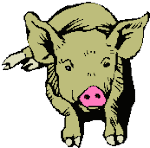Ouch!
The writer has long been a norovirus nerd. See award winning article here
The article below forget to mention that 76 per cent of oysters in the UK test positive for norovirus: see here
What they are still doing on sale is baffling. The situation elsewhere is little better.
Personally, the writer hoped that the Olympic Games opening would include British public health and the veterinary establishment in leg chains being whipped though the arena before being incarcerated on a remote very wet Scottish island for corruption and crimes against humanity.
Surely, someone, somewhere will eventually do something sensible, like mounting a major police investigation, not least into excessive secrecy to protect civil service pals and cronies.
Worse is still to come - watch this space.
Anyway, here is Barfblog - specialists in food safety
Heston Blumenthal: the gift that keeps on giving (for norovirus nerds)
POSTED: JULY 28TH, 2012 - 2:38PM BY DOUG POWELL
In Jan. 2009, the beginnings of the world's largest known restaurant-based norovirus outbreak began to take hold in Heston Blumenthal's fancy pants Fat Duck restaurant.
A new report in Epidemiology and Infection reiterates much of what was known at the time and summarized in a subsequent U.K. Health Protection Agency report, but still hammers home the point that a series of errors can culminate in a lot of people barfing.
About 591 in this outbreak.
The report doesn't mention The Fat Duck by name, but...
...Norovirus in raw shellfish, especially oysters, is nothing new. But the amplification of risk by a series of dumb assumptions (we can contain this) and omissions (don't tell anyone) is staggering.
"The size and duration of this outbreak exceed any other commercial restaurant-associated norovirus outbreaks in the published literature. It is hoped that lessons learned from this outbreak will help to inform future action by restaurateurs especially in early notification to public health authorities once an outbreak is suspected."
